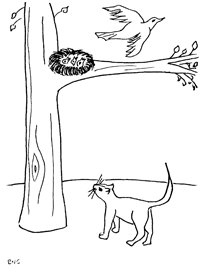Project
The group focuses on some aspects of the topic component of utterances in learners' texts, compared to native's texts, dealing in particular with the influence of the choice of topic component on the overall organization of different kinds of discourse (narratives, spatial descriptions, naturally occurring interactions, etc.).
The topic component is to be intended as intended as “the specification of the situation about [which] the utterance says something” (Klein i.p.), and includes a topic time, a topic place, a topic world and a topic entity.
The theoretical framework includes Klein’s (and other colleagues’) approach to finiteness, as well as (typological) models on information and discourse structure (by Givón, Haiman/Thompson, Myhill, Lambrecht and others), and communicative and functional approaches to discourse (i.e. von Stutterheim 1997).
Reference is also made to the framework of analogous L2 and L1 research done in other groups of the project (by Carroll, Lambert, von Stutterheim etc.; cf. Dimroth/Starren 2003, on L2; Berman/Slobin 1994 on L1).
Idea
The main idea is to ground the analysis of the topic component of learners' utterances on a broader discourse perspective, considering that topical means are also important cohesive discourse factors.
Furthermore, given that the factors determining information selection and information structure (included topic expressions and cohesive means) are at least partially guided by the grammar of the language used and by the grammar of other languages known by the speaker (mainly the first language), we think that a contrastive discourse analysis of the topic component of parallel texts produced by learners with different L1s (i.e. Russian, Italian, German, Spanish, Polish, English, French, Arabic, and possibly Chinese) would be relevant to identify some typical features of discourse, both in L1 and L2.
Such analysis could also help to reconstruct general or language-specific underlying principles of discourse and information organization as far as the topic component of native and learner varieties is concerned. Moreover we are interested in comparing different kinds of productions as well as child L1 with adult L2 productions, in order to find indications for the different roles played by universal and language-specific influences on discourse construction.
Research Areas
Researchers in the group focus on the following main topics:
A. language-specific influences on discourse organization
- information selection, topic assignment and perspectivation in learners' narrative and descriptive discourse compared to native speakers' discourse;
- topic treatment and referential movement in the domain of (topical) entities in learners' narrative discourse compared to native speakers' texts (with different ages);
- trends in the assignment of syntactic functions to topical entities in learners' discourse compared to native speakers' texts;
- organization of spatial descriptions as far as topical and non-topical spatial information is concerned
B. referential movement in learners discourse and topic/focus structure
- which means are used by natives and learners to introduce referents in texts;
- which means are used by natives and learners to maintain reference to entities;
- which means are used by natives and learners to re-introduce referents in texts.
C. topic treatment in NS-NNS dialogic contexts
- Discourse topic and topic management in local interactional sequences (i.e. adjacency pairs, insertion sequences, side sequences and opening/closing-up sequences)
- Topic introduction, maintenance, shift and re-introduction and participant exchange structures
- Topical entities, referential means and movement in NS-NNS conversational exchange
